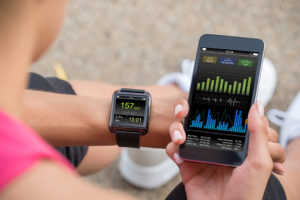
Do you find yourself running out of steam with your healthy New Year’s resolutions? Maybe you still feel motivated to lose weight, but you’re tired of counting calories to get there.
There may be another way—another thought process, if you will.
Given that we know a person is more successful in accomplishing their health or weight-loss goals when they track calories, here are some things to consider tracking that don’t include calories:
Fruit and vegetable servings
Fruits and vegetables are low in calories, high in vitamins, minerals, phytochemicals and fiber. Many experts agree we need 5 to 9 servings of them daily.
Proper hydration
Our bodies depend on water to survive. In fact, our body weight is made up of 60 percent water. Aim for eight 8-ounce glasses of water daily. Keep in mind you may need more if you are exercising or if you’re in a hot or humid environment.
Physical activity
Physically active adults are healthier, they feel better and they’re less likely to develop many chronic diseases such as cardiovascular disease, Type 2 diabetes and several types of cancer.
Commitment to moderate-to-vigorous physical activity also reduces feelings of anxiety and depression and improves sleep and quality of life. Aim for 150 minutes per week of moderate-intensity physical activity or 75 minutes per week of vigorous intensity physical activity.
Adults should also do muscle strengthening activities twice a week.
Dinner at home
Preparing meals at home allows you to control your calorie consumption. Frequent home cooks can consume 137 fewer calories and 16 fewer grams of sugar daily compared to those who opt for restaurants. Aim for six dinners at home each week.
Added sugar
The 2015-20 Dietary Guidelines suggests getting no more than 10 percent of your calories from added sugars.
A 2,000-calorie diet for example, would allow for 200 calories of added sugars per day, or about 50 grams worth.
A 1,600-calorie diet allows for 160 calories, or 40 grams of added sugar per day.
Sleep
Sleep is necessary to fight off infection, support proper metabolism of sugar, perform well in school and work effectively and safely.
Chronic shortened sleep—fewer than six hours per night—can increase your risk for heart disease, high blood pressure, obesity and diabetes. Adults typically need about seven to nine hours of sleep each night.
Late-night snacking
For some, this can be a hard habit to break. High fat intake at night has been shown to increase LDL cholesterol levels. Try choosing a healthier snack or avoiding the late-night fridge raid altogether.
Every small change adds up to big success. By tracking consumption and behaviors, you can keep your healthy resolutions going the whole year.
 /a>
/a>
 /a>
/a>
 /a>
/a>